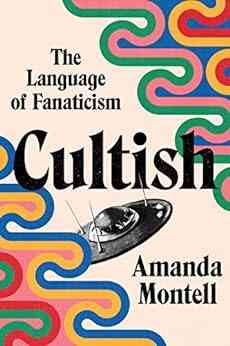The Dark Side of Human Devotion: Understanding Cultish Behaviour

Are you fascinated by the power cults hold over their followers? The psychology of cults has been a topic of intrigue for decades, as people try to comprehend the allure and control these groups exert on their members. In this article, we delve into the language of fanaticism and explore the inner workings of cults. Prepare to discover the dark side of human devotion as we unravel the mysteries behind cultish behavior.
The Nature of Cults: A Brief Overview
Cults are social groups centered around a charismatic leader or ideology, often characterized by their exclusive beliefs and practices. They exert a powerful influence on their members, making them susceptible to manipulation and control. The language used within cults plays a significant role in shaping the behavioral patterns and mindset of members.
Let's take a closer look at some of the key elements that contribute to the language of fanaticism:
4.3 out of 5
| Language | : | English |
| File size | : | 4429 KB |
| Text-to-Speech | : | Enabled |
| Screen Reader | : | Supported |
| Enhanced typesetting | : | Enabled |
| X-Ray | : | Enabled |
| Word Wise | : | Enabled |
| Print length | : | 319 pages |
1. Loaded Language: The Tool for Mind Manipulation
Cults employ loaded language to foster an "us versus them" mentality. By using jargon and unique terminology, cults create a sense of belonging and identity among their members. This language is often employed to control the thoughts and actions of followers, reinforcing the belief system peddled by the cult. For example, terms like "apostate" or "suppressive person" in Scientology are used to demonize those who question the group's teachings.
2. Love Bombing: The Art of Emotional Manipulation
Love bombing is a technique commonly used by cults to draw potential new members into their fold. It involves overwhelming individuals with love, attention, and praise to create a sense of dependency and loyalty. By employing this technique, cults aim to establish a powerful emotional connection that will make it difficult for individuals to leave the group later on.
3. Thought-Stopping Techniques: Silencing Dissent
Cults use various thought-stopping techniques to discourage critical thinking or questioning of their beliefs. Repetition of mantras, chanting, or even punishing dissenters are some examples of how cults suppress independent thought. By subjecting members to such practices, cult leaders maintain control and prevent any potential threat to their authority.
4. Cultic Slogans: The Power of Short Phrases
Cultic slogans are concise, memorable phrases that encapsulate the core beliefs of the group. These slogans act as powerful triggers, reinforcing the cult's teachings and reinforcing the group's identity. Examples such as "Drink the Kool-Aid" (Jonestown) or "Going Clear" (Scientology) have become synonymous with cults and carry potent connotations.
Understanding the Language of Fanaticism
By comprehending the language of fanaticism, we can shed light on the mechanisms cults employ to manipulate individuals. The persuasive power of loaded language, love bombing, thought-stopping techniques, and cultic slogans all contribute to the control exerted by cult leaders over their followers.
It is essential to raise awareness and educate people about the dangers of cultish behavior. By understanding how these techniques work, we can empower individuals to resist the allure of cults and make informed decisions.
The language of fanaticism is a key factor in shaping the behavior and mindset of cult members. Loaded language, love bombing, thought-stopping techniques, and cultic slogans all contribute to the control cults exert over their followers. By being aware of these practices, we can stay vigilant and protect ourselves and others from falling into the grasp of fanaticism.
4.3 out of 5
| Language | : | English |
| File size | : | 4429 KB |
| Text-to-Speech | : | Enabled |
| Screen Reader | : | Supported |
| Enhanced typesetting | : | Enabled |
| X-Ray | : | Enabled |
| Word Wise | : | Enabled |
| Print length | : | 319 pages |
The author of the widely praised Wordslut analyzes the social science of cult influence: how cultish groups from Jonestown and Scientology to SoulCycle and social media gurus use language as the ultimate form of power.
What makes “cults” so intriguing and frightening? What makes them powerful? The reason why so many of us binge Manson documentaries by the dozen and fall down rabbit holes researching suburban moms gone QAnon is because we’re looking for a satisfying explanation for what causes people to join—and more importantly, stay in—extreme groups. We secretly want to know: could it happen to me? Amanda Montell’s argument is that, on some level, it already has . . .
Our culture tends to provide pretty flimsy answers to questions of cult influence, mostly having to do with vague talk of “brainwashing.” But the true answer has nothing to do with freaky mind-control wizardry or Kool-Aid. In Cultish, Montell argues that the key to manufacturing intense ideology, community, and us/them attitudes all comes down to language. In both positive ways and shadowy ones, cultish language is something we hear—and are influenced by—every single day.
Through juicy storytelling and cutting original research, Montell exposes the verbal elements that make a wide spectrum of communities “cultish,” revealing how they affect followers of groups as notorious as Heaven’s Gate, but also how they pervade our modern start-ups, Peloton leaderboards, and Instagram feeds. Incisive and darkly funny, this enrapturing take on the curious social science of power and belief will make you hear the fanatical language of “cultish” everywhere.
Do you want to contribute by writing guest posts on this blog?
Please contact us and send us a resume of previous articles that you have written.




















Light bulbAdvertise smarter! Our strategic ad space ensures maximum exposure. Reserve your spot today!

 Terry PratchettThe Reverse Of The Medal Vol 11 Aubreymaturin Novels: A Riveting Tale of High...
Terry PratchettThe Reverse Of The Medal Vol 11 Aubreymaturin Novels: A Riveting Tale of High...
 Galen PowellUnleashing Your Acting Potential: Middle School Monologues Guys by Lindsay...
Galen PowellUnleashing Your Acting Potential: Middle School Monologues Guys by Lindsay...
 Haruki MurakamiDiscover the Mind-Bending World of Philosophia Darren Donnell: The Art of...
Haruki MurakamiDiscover the Mind-Bending World of Philosophia Darren Donnell: The Art of...
 Miguel de CervantesThe Epic Battle Unveiled: The Song of Roland in Two Translations Halcyon...
Miguel de CervantesThe Epic Battle Unveiled: The Song of Roland in Two Translations Halcyon...
 Devon MitchellThe Adorable Little Santa Crochet Pattern Cocoon And Hat - Perfect Holiday...
Devon MitchellThe Adorable Little Santa Crochet Pattern Cocoon And Hat - Perfect Holiday... Casey BellFollow ·18.7k
Casey BellFollow ·18.7k Mario Vargas LlosaFollow ·2.5k
Mario Vargas LlosaFollow ·2.5k Jack PowellFollow ·3.9k
Jack PowellFollow ·3.9k Esteban CoxFollow ·2.9k
Esteban CoxFollow ·2.9k Paulo CoelhoFollow ·7k
Paulo CoelhoFollow ·7k Harry HayesFollow ·9.6k
Harry HayesFollow ·9.6k Donald WardFollow ·13.5k
Donald WardFollow ·13.5k Robin PowellFollow ·8.5k
Robin PowellFollow ·8.5k

 Jesus Mitchell
Jesus MitchellUnveiling the Cosmic Mystery: The Star Emkay Connor...
The universe is an endless expanse filled...

 Roy Bell
Roy BellGood Hunting: Can You Kill the King? - A Thrilling...
Are you ready for an...

 Gary Cox
Gary CoxThe Face Changers: Jane Whitefield - A Master of Disguise
Imagine a world where you could change...

 Dashawn Hayes
Dashawn HayesChristmas Wishes Key Largo Christmas: A Magical...
The holiday season is truly a time of wonder...

 Kirk Hayes
Kirk HayesUnearth the Mysteries with Relic Hunter Coastal Vigilante
Welcome to the world of Relic...

 Kevin Turner
Kevin TurnerPlaying With Myself: Randy Rainbow Takes the Stage
Do you enjoy music, comedy, and quick-witted...

 Virginia Woolf
Virginia WoolfTank Blue Collar Billionaires Malone: The Inspiring Rags...
When you think of billionaires, images of...

 Norman Butler
Norman ButlerGive The Baby To The Fuhrer - A Gripping Military Fiction...
The Third Reich's involvement in World...

 Mike Hayes
Mike HayesConfessions of a Sociopath: Unveiling the Dark Mind
Have you ever wondered what goes on...

 Austin Ford
Austin FordThe Lost Nebula Lost Starship 16: An Epic Journey Beyond...
Have you ever dreamt of embarking on a...

 Guillermo Blair
Guillermo BlairPoison Orchids: A Darkly Compelling Psychological...
If you're a fan of gripping psychological...

 Carlos Fuentes
Carlos FuentesApache Nifi 51 Interview Questions: A Comprehensive Guide...
Are you preparing for a job interview that...
4.3 out of 5
| Language | : | English |
| File size | : | 4429 KB |
| Text-to-Speech | : | Enabled |
| Screen Reader | : | Supported |
| Enhanced typesetting | : | Enabled |
| X-Ray | : | Enabled |
| Word Wise | : | Enabled |
| Print length | : | 319 pages |










